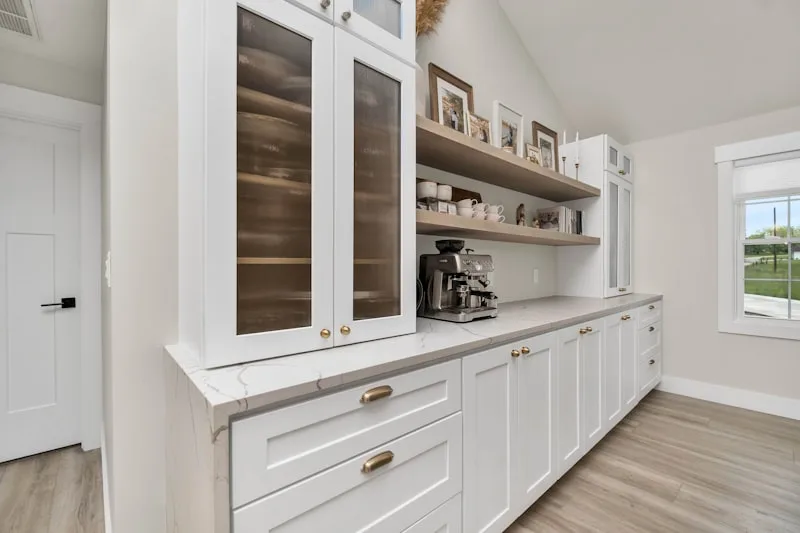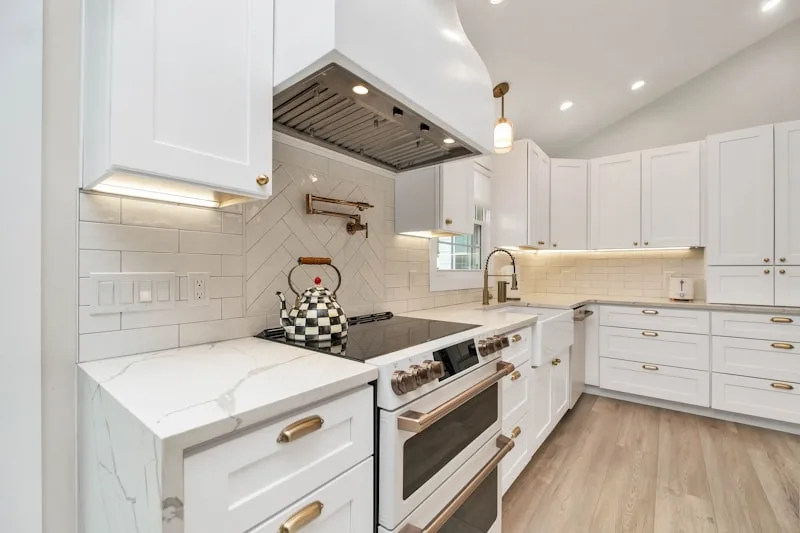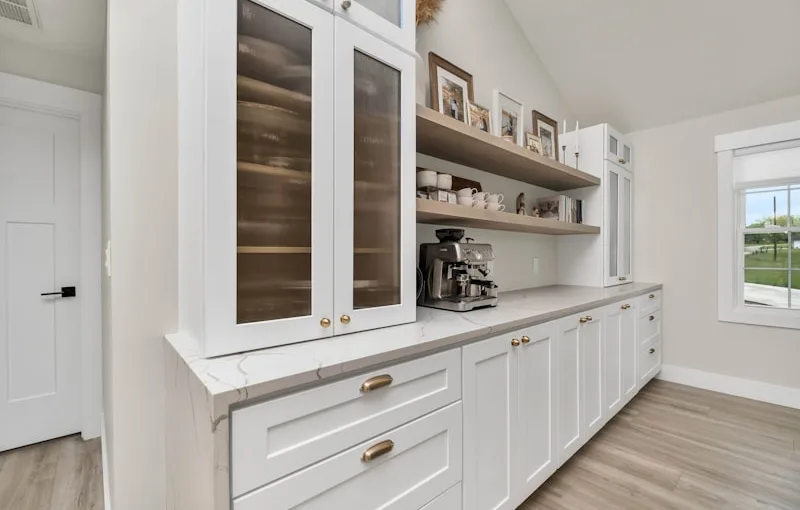First off, let’s talk about the tools you’ll need. Grab a screwdriver—preferably a Phillips head—and maybe a level if you want to get fancy. Now, take a good look at those hinges. Most kitchen cabinets have adjustable hinges that allow you to tweak the alignment. It’s like giving your cabinets a little makeover without the expense of a full renovation!
Start by loosening the screws on the hinge slightly. This is your chance to play around with the door’s position. If the door is too high, gently pull it down; if it’s too low, lift it up. You can also adjust the door’s depth by moving it in or out. It’s like adjusting the fit of your favorite pair of jeans—just a little tweak can make all the difference!
Now, here’s a pro tip: if your cabinet doors are uneven, adjust the hinges on one side first, then step back and take a look. It’s all about that perfect balance. And don’t forget to tighten those screws once you’re happy with the alignment. You don’t want your cabinets to go rogue after all your hard work!
Unlocking the Secrets: A Step-by-Step Guide to Adjusting Kitchen Cabinet Hinges
First off, grab a screwdriver—this is your trusty sidekick in this little adventure. Most cabinet hinges have three adjustment screws: one for height, one for depth, and one for side-to-side movement. Think of these screws as the dials on a radio; a little twist can make a world of difference.
Start with the height adjustment. If your cabinet door is sitting too high or too low, simply turn the top screw clockwise to raise it or counterclockwise to lower it. It’s like giving your cabinet a little lift or a gentle nudge down.
Next up is the depth adjustment. If your door is sticking out too far or sinking in, this is where you’ll want to focus. Turn the screw on the hinge plate—clockwise to pull it in and counterclockwise to push it out. It’s like adjusting the fit of your favorite jacket; you want it just right!
Finally, let’s tackle the side-to-side adjustment. If your cabinet door is looking a bit lopsided, this is your moment to shine. Adjust the screw on the hinge itself to align the door perfectly with the adjacent one. It’s like straightening a picture frame on the wall—satisfying, right?
With just a few simple tweaks, you can transform your kitchen cabinets from clunky to classy. So, roll up your sleeves and get ready to unlock the secrets of those hinges!
Hinge Hacks: Transform Your Kitchen with Simple Cabinet Adjustments
First off, let’s talk about those pesky cabinet doors. If they’re not closing properly or are slightly askew, it’s usually a hinge issue. Grab a screwdriver and check the screws on the hinges. Sometimes, they just need a little tightening. Think of it like giving your cabinet a gentle hug—just enough to keep everything in place. If the doors are still misaligned, you might need to adjust the hinges themselves. Most hinges have a bit of wiggle room, allowing you to shift them up, down, or sideways. It’s like giving your cabinets a mini makeover without the hefty price tag!

Now, let’s not forget about the shelves. If they’re sagging under the weight of your beloved cookbooks, it’s time to step in. You can easily raise the shelves by adjusting the shelf pins. It’s like giving your shelves a boost of confidence! Just pop them out and move them to a higher hole. Voila! More space for your kitchen gadgets and less clutter.
And here’s a little secret: if you want to add a touch of style, consider painting the cabinet doors or adding some decorative hardware. It’s like putting on a fresh outfit—suddenly, everything feels more vibrant and inviting. So, roll up your sleeves and get ready to transform your kitchen with these simple hinge hacks. You’ll be amazed at the difference a few adjustments can make!
Say Goodbye to Sagging Doors: Mastering the Art of Cabinet Hinge Adjustment
First off, let’s talk about those hinges. They’re the unsung heroes of your cabinets, but over time, they can get a little loose, causing that annoying sag. Think of them as the backbone of your cabinet doors. When they’re out of whack, it’s like trying to walk with a crooked spine—just doesn’t work well!

To get started, grab a screwdriver and take a good look at the hinges. You’ll want to tighten any loose screws first. It’s like giving your hinges a little pep talk—“You got this!” If that doesn’t do the trick, you might need to adjust the hinge position. Loosen the screws slightly, and you can shift the hinge up or down. It’s like adjusting the height of a chair to fit just right!
Now, if your cabinet doors are still misbehaving, consider adding a shim. A shim is like a little support buddy for your hinges, helping to lift that door back into place. Just slide it in where needed, and voilà! Your cabinet door should be standing tall again.
The Ultimate DIY Guide: Perfectly Aligned Kitchen Cabinets in Just Minutes
First things first, grab a level. This little tool is your best friend in the quest for cabinet alignment. Think of it as your kitchen’s personal trainer, helping you whip those cabinets into shape. Start by checking the level of your cabinets. If they’re off-kilter, don’t panic! Most cabinets come with adjustable feet or hinges that can be tweaked to get everything just right.
Next, let’s talk about shimming. It sounds fancy, but it’s really just a way to fill in gaps. If your cabinets are uneven, slip a shim (a thin piece of wood or plastic) under the lower side. It’s like giving your cabinets a little boost, helping them stand tall and proud.
Now, if you’re dealing with a corner cabinet, you might need to get a bit creative. Use a measuring tape to ensure that the distance from the wall to the cabinet is the same on both sides. If it’s not, adjust accordingly. It’s like making sure your shoes are tied evenly before you head out the door—small adjustments can make a world of difference!
From Frustration to Functionality: How to Adjust Your Kitchen Cabinet Hinges Like a Pro
First off, let’s talk tools. You don’t need a full toolbox for this job—just a screwdriver and maybe a level if you’re feeling fancy. Now, if your cabinet doors are sagging or not closing properly, it’s usually a sign that the hinges need a little TLC. Start by checking the screws on the hinges. Sometimes, they just need a good tightening. Think of it like giving your hinges a little hug—tighten them up, and they’ll feel supported!
If tightening doesn’t do the trick, it’s time to adjust the hinges themselves. Most cabinet hinges have a few adjustment screws that allow you to move the door up, down, or sideways. It’s like playing a game of Tetris—just a little twist here and there can make a world of difference. If your door is too high, loosen the top hinge screw and gently push the door down. If it’s too low, do the opposite.
And don’t forget about the alignment! A misaligned door can be an eyesore. Use your level to check if everything is straight. If not, a slight adjustment to the hinge can make it look like a million bucks.
Frequently Asked Questions
What Tools Do I Need to Adjust Kitchen Cabinet Hinges?
To adjust kitchen cabinet hinges, you typically need a screwdriver (either Phillips or flathead, depending on the screws), a level to ensure proper alignment, and possibly a measuring tape for precise adjustments. In some cases, a drill may be necessary for more extensive modifications.
How Do I Maintain and Lubricate Cabinet Hinges?
To maintain and lubricate cabinet hinges, first clean them with a damp cloth to remove dust and grime. Then, apply a suitable lubricant, such as silicone spray or WD-40, to the moving parts of the hinges. Open and close the cabinet doors several times to ensure even distribution of the lubricant. Regular maintenance every few months will help prevent squeaking and ensure smooth operation.
How Can I Fix Misaligned Cabinet Doors?
To fix misaligned cabinet doors, first check the hinges for loose screws and tighten them if necessary. Adjust the hinges by loosening the screws slightly and repositioning the door until it aligns properly. If the door is still misaligned, consider using shims to adjust the height or depth. Finally, ensure that the cabinet frame is level, as an uneven surface can also cause misalignment.
How Do I Identify the Type of Cabinet Hinges I Have?
To identify the type of cabinet hinges you have, start by examining the hinge’s shape and design. Look for features such as the mounting style (overlay, inset, or half-overlay), the hinge’s material (metal or plastic), and whether it is a concealed or exposed hinge. Measure the hinge’s dimensions, including the width and length, and check for any brand markings. Comparing these characteristics with online resources or hinge catalogs can help you determine the specific type.
What Are the Steps to Adjust Soft-Close Hinges?
To adjust soft-close hinges, first, open the cabinet door fully. Locate the adjustment screws on the hinge; typically, there are two: one for depth and one for side-to-side alignment. Use a screwdriver to turn the depth screw clockwise to increase the soft-close effect or counterclockwise to decrease it. Adjust the side screw to align the door properly with the cabinet frame. Close the door to test the adjustment, and repeat as necessary until the desired soft-close action is achieved.
